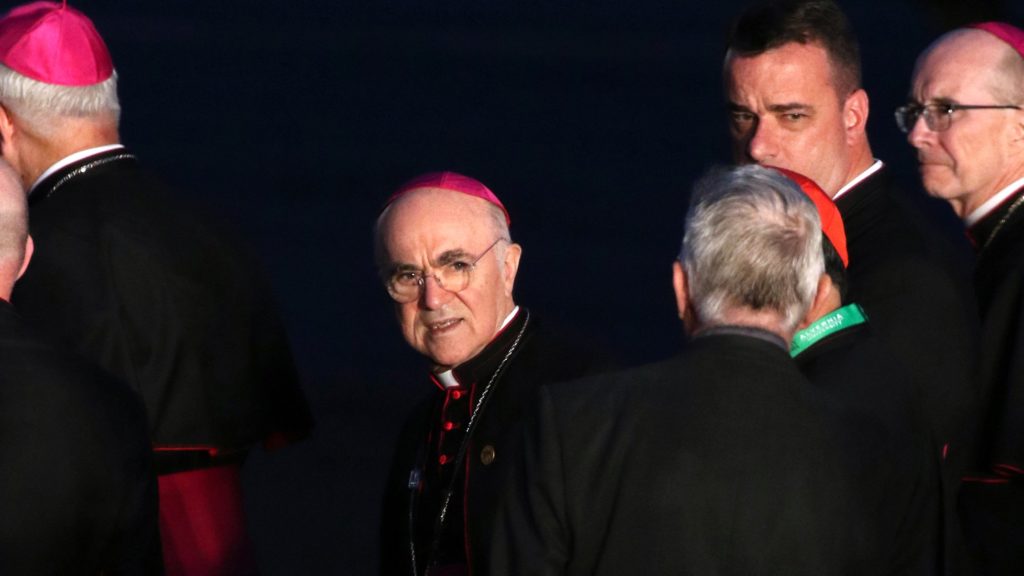ROME — When news broke this week that the Vatican, at long last, had formally charged Archbishop Carlo Maria Viganò with schism, the exultation on the Catholic left was entirely predictable. What has been perhaps slightly more surprising has been the public support the move has drawn on the Catholic right.
Here in Italy, the country’s most prominent political fixer, and a man long linked to conservative parties and politicians, and perhaps the country’s most influential conservative newspaper, came out June 21 backing the schism charge, and in both cases the reaction could best be summed up as “it’s about damn time.”
Consultant Luigi Bisignani, a one-time confidante of the late Italian Prime Minister Silvio Berlusconi, characterized Viganò with open contempt — among other things, calling him a “ferocious family bureaucrat” and suggesting his anti-Francis campaign may be at least as much about money as principle.
Meanwhile, an unsigned editorial in the newspaper Il Foglio was even more caustic, complimenting the pope for taking action and saying the Catholic Church is too serious a thing to tolerate the sort of “trash” propagated by Viganò.
To be clear, this is not the first time mainstream conservatives have attempted to distinguish themselves from the former papal envoy to the U.S. Two years ago, for example, after Viganò issued a statement on the Ukraine war largely echoing Russian propaganda, George Weigel publicly wrote that Viganò had “written the obituary for what remained of his once-considerable religious and moral authority.”
The fact that conservatives apparently are so eager to toss Viganò under the bus again now, however, underlines a highly counterintuitive truth: There’s an ironic sense in which for the last six years, Viganò has been Francis’ best friend.
From the beginning, mainstream conservative reaction to Francis can perhaps best be described as a mixed bag. They don’t question the legitimacy of his election or his rightful authority as pope, they don’t believe he’s a freemason, a communist or a heretic, and they don’t want him deposed.
For the record, most also don’t regard either the coronavirus or global warming as hoaxes, they don’t defend Vladimir Putin, and they don’t regard Davos as a Satanic cabal.
Mainstream conservatives generally applaud some aspects of Francis’ papacy, while harboring reservations about others. Some may wish the pontiff was a bit more cautious in his public statements. For instance, some may regard his pastoral openness to the LGBTQ+ community and other groups as potentially misleading, while still others may wonder about his hostility to the Latin Mass.
Recently, many of those mainstream conservatives were disappointed in Fiducia Supplicans, the document of the Dicastery for the Doctrine of the Faith approving blessings for persons in same-sex relationships.
None of this, for the record, amounts to a rejection of Francis’ magisterium tout court (plain and simple), and it all falls into the realm of noninfallible prudential papal judgments, about which it’s perfectly possible for Catholics of good faith and genuine obedience to have different views.
However, as a matter of politics rather than strict logic, it’s often been difficult for many conservatives to voice such objections for fear of being lumped in with Viganò and the extremist crowd which provides his natural base of support.
Among Francis’ most ardent cheerleaders, implying a link with Viganò, has become a preferred rhetorical trope for dismissing, or minimizing, criticism of the pontiff.
In the wake of the recent decree, for example, some commentators have made a point of reminding the world that a number of American bishops said back in 2018 that Viganò’s initial accusations regarding the Theodore McCarrick case deserved to be taken seriously — as if it were possible back then for an American bishop to dismiss any abuse allegation outright, not to mention to anticipate what Viganò might later become.
With every subsequent step into the mad hatter world of conspiracy theories and alleged globalist plots, Viganò has not only discredited himself, but, under the heading of guilt by association, anyone else who might have something critical to say.
Now, however, the Vatican’s action provides those mainstream conservatives with a natural opportunity to cut Viganò loose, trying as much as possible to put distance between themselves and the orbit into which the former papal envoy to the U.S. has drifted.
Assuming that a formal decree of schism is issued, in effect it will provide the mainstream right with a clear dividing line to which they can point: He’s been convicted of schism, we haven’t.
Il Foglio’s reaction in this regard was perhaps the most acerbic.
“Mercy and human patience are all well and good, but in the end there’s a limit,” the editorial said. “The church is too serious a thing to allow the diffusion, almost the metastasis, of trash inside herself.”
Once upon a time, another public figure who saw enemies everywhere, Richard Nixon, publicly vowed that “you won't have Nixon to kick around anymore.” Of course, that wasn’t true — Nixon made the remark after losing the 1962 California governor’s race, but came back to win the presidency and, frankly, to get kicked around more than he could have possibly imagined, most of it his own fault.
In a different key, much the same thing may turn out to be true of Viganò. He may well outlive a Vatican condemnation, even using it to propel himself to a new level of celebrity in certain circles as a martyr.
If so — if, in fact, we will still have Viganò to kick around for a while — among those most pleased, oddly enough, might just be Francis himself.

